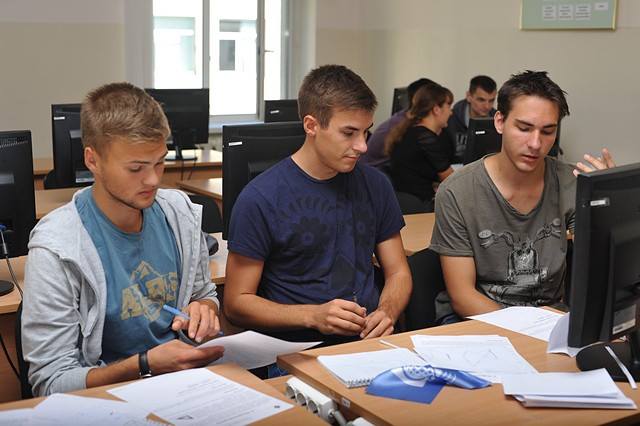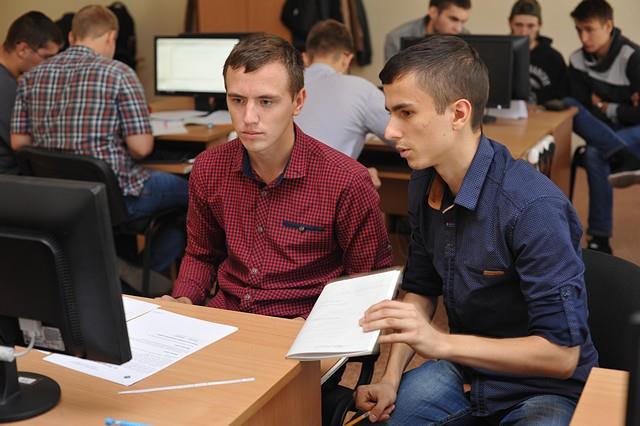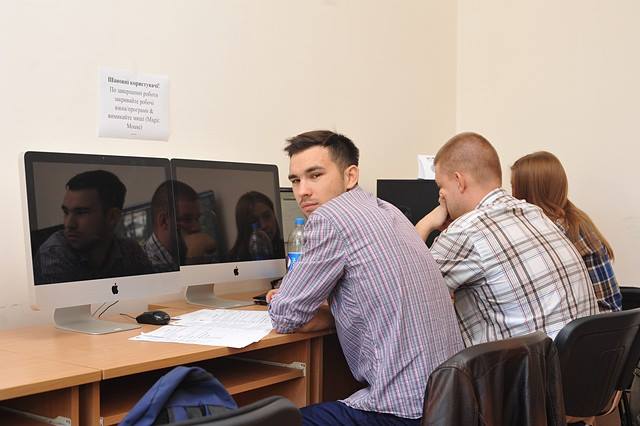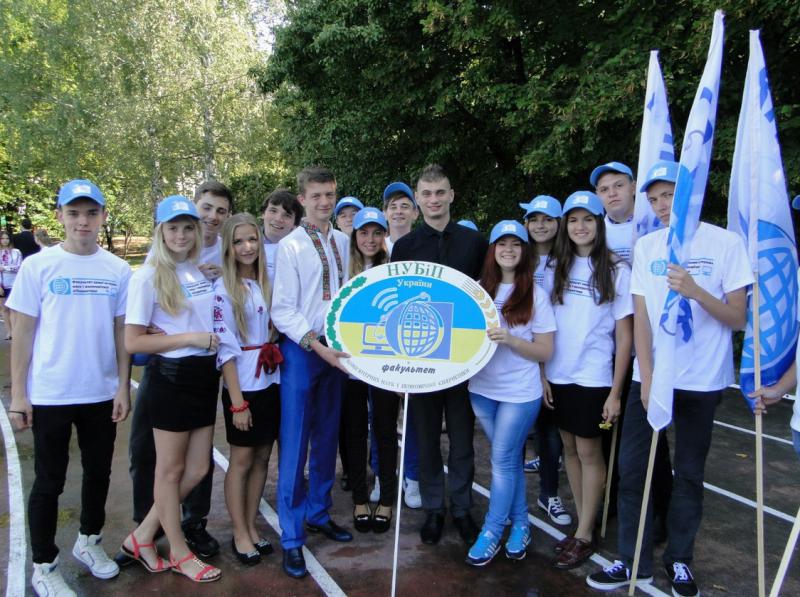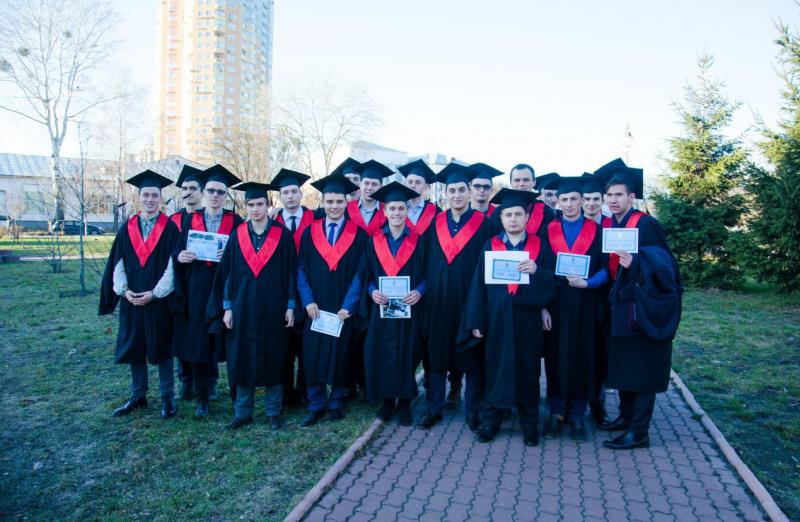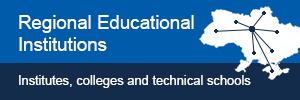Educational work
We train a modern specialist for practical activities in various sectors of the economy using innovative technologies. Professionals from leading world manufacturers of hardware and software such as IBM, Microsoft, Intel, Cisco, Procom are involved for the training of students.
The Faculty of Information Technologies of NUBiP of Ukraine provides a complete cycle of training specialists in digital technologies, from bachelor's to master's. The educational process is built on the principles of a student-centered approach, individualizing the academic trajectory, practical orientation, and continuous improvement.
The educational programs of the faculty meet the modern requirements of the labor market, international standards, and the National Qualifications Framework. They cover fundamental training in computer science, software engineering, information systems, cybersecurity, digital economics, and economic cybernetics. Students can study full-time, part-time, or through distance learning.
Training takes place in a modular rating system, using interactive technologies, laboratory workshops, Moodle e-learning environment, certification programs from Cisco, Microsoft, and other international platforms. Much attention is paid to practical training: educational, industrial practice, internships in IT companies, and research institutions.
The faculty creates conditions for deep professional growth of students through participation in scientific circles, conferences, hackathons, competitions, and international mobility programs. This approach ensures graduates' high level of competitiveness in the national and global labor market.
Specialties and educational programs of the Bachelor's degree program
Bachelor's degree studies are carried out in licensed specialties that correspond to modern IT trends and priorities of digital development of the economy and society. Each educational program combines theoretical training with practical experience, project work, and the possibility of certification according to international standards.
Form of study: full-time/part-time / distance
learning Duration of study: 3 years 10 months (based on complete general secondary education)
Language of instruction: Ukrainian (some disciplines - in English)
F2 /121 – Software Engineering
Educational Program: Software Engineering
Training highly skilled software developers capable of creating, testing, and implementing information systems and applications. Particular attention is paid to the software lifecycle, object-oriented design, DevOps approaches, system analysis, and UI/UX.
F3 /122 – Computer Science
Educational program: Computer Science
Focus on data analytics, intelligent information systems, machine learning, artificial intelligence, and high-performance computing. Students learn programming languages, data structures, algorithms, distributed computing, and modeling complex systems.
F7 /123 – Computer Engineering
Brief description:
The educational program is focused on studying the architecture of computer systems, digital devices, embedded systems, IoT, and the development and testing of microcontrollers, cyber-physical systems, and robotics.
F5 / 125 - Cybersecurity
Short description:
The program aims to form specialists in information protection, cryptography, countering cyber threats, ethical hacking, IT infrastructure audit, and legal aspects of cybersecurity.
F4 Systems Analysis and Data Science / 051 Economics (Economic Cybernetics / Digital Economy)
Educational programs:
- Economic cybernetics
- Digital economy
Interdisciplinary training combining economic analytics, mathematical modeling, computer science, and modern digital technologies. Graduates can simulate economic processes, develop information and analytical systems, and make decisions in conditions of uncertainty.
F6 / 126 – Information Systems and Technologies
Educational program: Information Systems and Technologies
The program is focused on training specialists capable of developing, implementing, and administering information systems in the management of enterprises, public authorities, financial institutions, and the agricultural sector. Graduates master the skills of modeling business processes, working with databases, web technologies, ERP and CRM systems, and data analytics technologies.
Particular attention is paid to project work, digital transformation of organizations, integration of IT systems, and cloud services. Students can obtain certificates from international companies (Microsoft, Cisco) and work in IT consulting, analytics, and information management.
Specialties and educational programs of the Master's degree
Master's programs of the Faculty of Information Technology are aimed at in-depth professional training and analytical, research, and managerial competencies development. The programs are built on the principle of practice-oriented learning and integrate scientific, experienced, and international components.
Duration of study: 1 year 4 months (based on bachelor's degree)
Language of instruction: Ukrainian / English (according to separate programs)
Form of study: full-time/part-time
Feature: a significant part of master's programs involves internships in partner companies and joint projects with business and research institutes.
F2 /121 – Software Engineering
Educational program: Information Systems Software
The program focuses on creating, analyzing, testing, and maintaining complex software systems. Approaches to developing distributed systems, cloud services, DevOps, and software quality assurance methods are studied. Preparation includes the implementation of an applied project or scientific research.
F3 /122 – Computer Science
Educational programs:
- Information control systems and technologies
- Computer environmental and economic monitoring
The first program is project analytics and the development of intelligent IT solutions for business, agriculture, and the environment. The second is interdisciplinary, aimed at spatial data processing, satellite monitoring, and ecosystem modeling. GIS, Python, ML, and Big Data are actively used.
F7 /123 – Computer Engineering
Profile and uniqueness:
In-depth training in IoT, smart devices, robotics, network protocols, and real-time. Students undergo internships based on specialized laboratories and have the opportunity to work on projects in agricultural automation, smart cities, and digital factories.
F5 /125 – Cybersecurity
Educational program: Information and cybersecurity of organizations
Focus on information security management, risk management, enterprise infrastructure security, and ethical hacking. ISO standards, national and international regulations, and digital forensics are studied. The opportunity to undergo an internship in cybersecurity structures.
F4 Systems Analysis and Data Science /051 – Economics
Profile and uniqueness:
Integration of modern economic knowledge with analytics, mathematical modeling, and IT. The focus is forecasting, risk assessment, business process modeling, R, Python, and SPSS. The program has a high research component and opens the way to graduate school.
Forms of training
The Faculty of Information Technology offers a flexible higher education system that considers students' life circumstances, professional needs, and individual goals. Training is possible in three forms:
Full-time (full-time) form
The main form of education involves daily attendance at classes on the university campus. Students receive a full range of classroom training: lectures, laboratory and practical courses, circle participation, hackathons, and conferences. This form is optimal for graduates of schools and colleges who seek active involvement in university life and close interaction with teachers.
Correspondence form
Designed for those who combine study with work or live in remote regions. The educational process is organized into introductory, intermediate, and final sessions. Students receive methodological materials, access to electronic courses and consultations, and perform individual tasks. The part-time form is especially convenient for specialists who want to improve their skills.
Distance form
All courses are taught online through the Moodle (http://elearn.nubip.edu.ua) platform, Zoom, Google Meet, etc. Students can freely form their schedule, view lecture recordings, perform interactive tests, and submit papers remotely.
Note: Students of all forms of education have equal access to the resources of the faculty: e-courses, library, consultations, participation in competitions, internships, and mobility programs.
Material and technical base
The Faculty of Information Technologies of NUBiP of Ukraine has a modern infrastructure that provides a high-quality educational process and practical training of students. The classroom, laboratories, and computer labs are equipped per the requirements of the IT industry and international standards.
Classrooms are held in spacious lecture and seminar halls with multimedia projectors, Internet access, and interactive whiteboards. Classrooms with interactive panels and presentation tools are used for teaching general and special disciplines.
Computer classes - the faculty has more than 10 computer laboratories in educational buildings No. 10 and No. 15, equipped with:
- modern PCs with Intel i5-i7 processors, RAM 8-16 GB;
- installed Windows, Linux, macOS;
- Microsoft Office, Visual Studio, SQL Server, MATLAB, Adobe, Cisco Packet Tracer, Python, Java, NetBeans, Docker, etc.
All computers are connected to the university network and have access to the Internet.
Educational laboratories - specialized laboratories function in the departments of the faculty:
- Laboratory of Intelligent Information Systems
- Programming Lab
- Cybersecurity Laboratory (Cyber Polygon)
- Internet of Things (IoT) Lab
- 3D modeling and printing
- E-Counseling Center
- Digital Economy Competence Center
- Microsoft Imagine Academy
Each laboratory has a separate area of training used for laboratory classes, scientific research, hackathons, training, and certification.
Availability of laboratories and equipment
Students can access equipment in their free time for independent work, consultations, project preparation, and assignments. The university supports uninterrupted software updates and modernization of the technical base.
Practical training
The Faculty of Information Technologies pays considerable attention to the formation of practical skills of future IT specialists. Practical training is integral to educational programs of all levels — bachelor's and master's — and covers several stages: academic practice, industrial practice, and pre-graduation practice.
The purpose of the practice is to give students real experience in developing, implementing, and testing IT solutions, and to familiarize them with teamwork, corporate culture, and modern project management tools.
Faculty practice bases - practice is organized based on partnership with leading IT companies, institutions, and research centers. Among them:
- Unicorn Systems
- SAS Institute Ukraine
- Sigma Software
- WorkNest
- 1C: Procom
- Cisco Networking Academy
- MTI GROUP
- Institute of Cybernetics. V.M. Glushkova of the National Academy of Sciences of Ukraine
- Institute of Software Systems of the National Academy of Sciences of Ukraine
- Institute of Telecommunications and Global Information Space of the National Academy of Sciences of Ukraine
- IT4Medicine
- Beiersdorf Ukraine
- AgroOnline
- RB "Kyivcentraero"
Formats and conditions of internship
- Full-time form: work in companies with a presence in the enterprise.
- Distance practice: for students from other regions or under international agreements.
- Project practice: developing an IT solution based on a department or a partner company.
The faculty contributes to the official registration of internships, concludes contracts, and provides individual practice management by a scientific and pedagogical worker.
Integration with training - the internship results are used in writing coursework, qualifications, master's theses, startup participation, competitions, and hackathons. Students receive real cases, portfolios, and, in many cases, job offers.
Training courses and methodological support
The educational process at the Faculty of Information Technologies is supported by modern methodological support and a developed electronic educational infrastructure. All academic disciplines are accompanied by electronic training courses (ENC), available to students 24/7.
Moodle distance learning platform
The main environment for online learning is the Moodle (http://elearn.nubip.edu.ua) system, which hosts more than 300 courses by faculty teachers. Each course includes:
- training programs;
- lecture materials (text, video, presentations);
- practical tasks;
- tests for self-examination;
- tests and project cases;
- Forums for communication and consultation.
Methodological materials
Each department of the faculty provides students with printed and electronic:
- textbooks and textbooks;
- methodological recommendations for practical and laboratory work;
- collections of typical tasks;
- materials for independent work.
Most materials are adapted to the modular system and comply with ECTS.
Other platforms and services
- Google Workspace for Education – for online conferences, testing, and collaborating on documents.
- Microsoft Teams / Zoom are platforms for lectures, seminars, and project defenses.
- GitHub / GitLab – used for code management and teamwork.
- Cisco NetAcad – IT certification courses in the field of network technologies.
- 1C: Educational complexes – courses on the enterprise's IS and accounting automation.
Contact Information
Deputy Dean for Educational and Educational Work,
Klymenko Natalia Anatoliivna, Candidate of Economic Sciences, Associate Professor
Phone: 527-83-52
Email: [email protected]
Thanks to the integration of learning platforms, students get personalized access to courses, a convenient feedback system with the teacher, and support during distance or blended learning.

The specialty "Economy" (Economic Cybernetics, Digital Economics) is a unique combination of computer, economic disciplines and information and communication technologies. This provides the opportunity to work in various areas of the digital economy. The training is based on the use of information and communication and digital technologies, the knowledge of new information technologies with the use of the Internet of things, large data, artificial intelligence, digital smart technologies and the system of knowledge on special mathematical disciplines, theoretical and professional knowledge of new information technologies with the use of computer technology in the economy. The obtained knowledge enables to develop systems of models for the study of socio-economic phenomena for practical and research purposes; create and use static and dynamic expert systems for business processes. These programs offer benefits in terms of digitization of the economy, the social and social spheres, awareness of existing challenges and tools for developing digital infrastructures, gaining digital competences, and identifying areas and projects for the digitization of the domestic market.
Within the framework of the specialty "Computer Science" we train a broad-profile specialist to participate in various fields of activity that require fundamental knowledge in mathematics, physics, computer science, natural sciences, humanities and socio-economic disciplines.
The student will gain the following professional and practical skills: possession of algorithmic thinking, software engineering techniques for software implementation taking into account the requirements for its quality and performance characteristics, the development of methods and systems of artificial intelligence in the process of learning.
Graduates of Computer Science training can apply for following job positions: programmer engineer, administrator of local and corporate networks, specialist in the design and development of information and automation systems, systems of artificial intelligence and expert systems, specialist in Web design, etc.
The specialty "Software Engineering" provides students with the benefits of algorithmic thinking, engineering software methods for implementing software to meet the requirements for quality and reliability.
Practical training of students is aimed at mastering the basic methods and technologies of software systems development.
Software engineering involves the application of a systematic, measurable approach to the design, use and maintenance of software, and the study of these approaches.
Today, software engineering professionals are most demanded on the job market among other IT professionals, they are involved in the development of domestic and international software projects, and have decent pay for their work.
Specialty "Computer Engineering" allows a graduate as a professional programmer to independently develop and use system and application software, in particular, to develop and use information systems, databases, computer-aided design systems, interactive systems, embedded programs for specialized computer systems.
In the field of computer hardware, specialty allows a graduate to design and develop universal and specialized computer systems controllers, adapters, local, global and corporate computer networks at the level of individual units and nodes.
The specialty "Cyber Security" provides knowledge of programming and computer technology, cybersecurity, software and technical methods of information security, cryptography, legal and social aspects of information security, as well as information security management.
Cybersecurity is the process of implementing security measures to ensure the confidentiality, integrity and availability of data. Cybersecurity provides protection of resources (information, computers, servers, enterprises, private individuals). Cyber security is intended to protect data at the stage of their exchange and preservation. These security measures include access control, training, audit and risk assessment, testing, management and authorization security.
A cybersecurity specialist is engaged in the development of security systems for various communication networks and electronic databases, tests and improves their own and third-party developments to avoid the risk of leakage of information constituting state or commercial secrets, confidential information.
This profession is relatively new, but has already become widespread in connection with the introduction of computer and network technologies in virtually all organizations - from small commercial firms to state security agencies.
